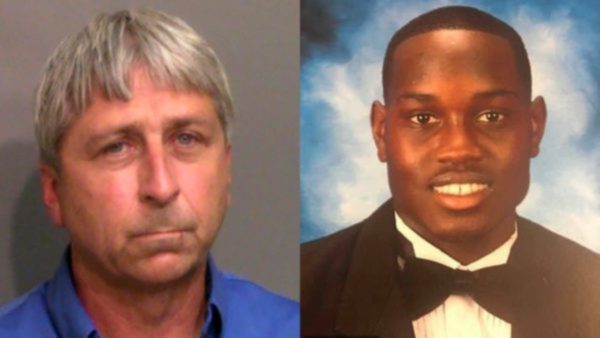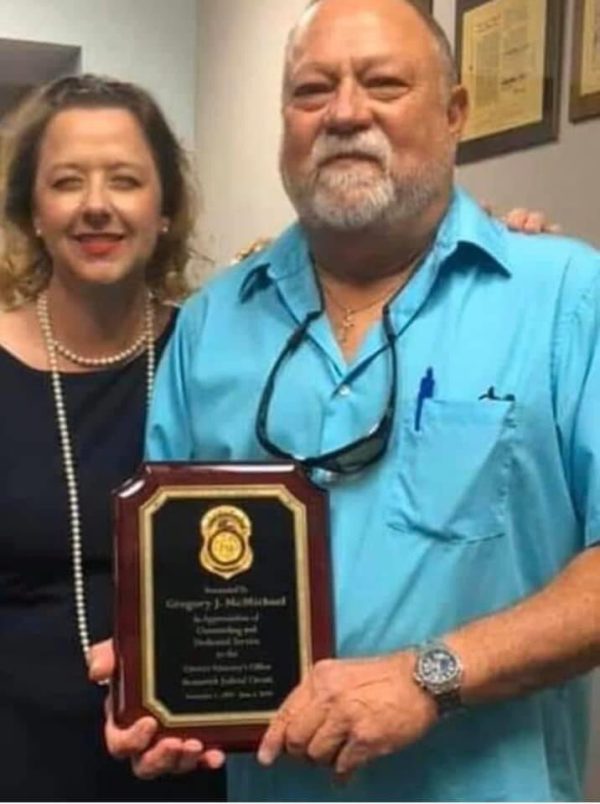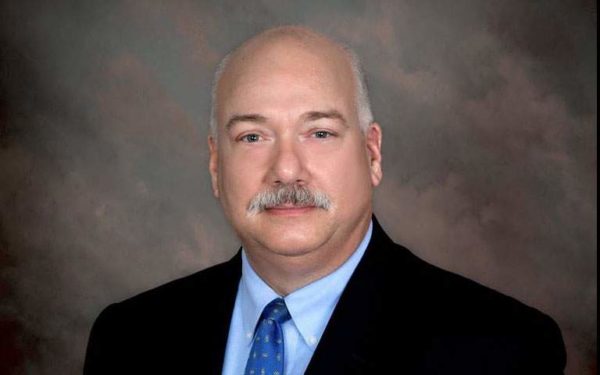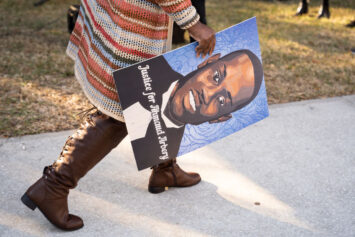William Roderick “Roddie” Bryan, one of the men accused of helping to kill Ahmaud Arbery last year, has filed a motion to disqualify the new Black district attorney who’s overseeing his prosecution.
Arbery, a 25-year-old Black man, was killed by shotgun blasts from Travis McMichael while jogging through a predominantly white neighborhood in Brunswick, Georgia, in February 2020. Bryan is one of three men charged with murder in connection with his death.

Bryan’s attorney Kevin Gough filed a motion in Glynn County Court on March 1 asking a judge to kick newly minted Cobb County District Attorney Flynn Broady Jr. off the case.
Broady, a Democrat, unseated Republican incumbent Joyette Holmes in November to become the Cobb County district attorney. He assumed office Jan. 4 and took over the role as special prosecutor in Arbery’s murder cases last month.
Broady is a U.S. Army vet who spent 26 years in the armed forces before becoming an attorney. He
served as a Cobb County assistant solicitor general and DUI prosecutor before making his successful run for office last year.

But Gough pointed to some of the comments Broady made during his run for office, saying he is unfit to fairly manage Bryan’s prosecution.
According to the attorney, Arbery’s case was a centerpiece of Broady’s campaign. He argued that Broady courted the support of Black Lives Matter, the NAACP, the Democratic Party and micro-targeted voters with his message while stumping for office.
“Indeed, Broady appears to have done exactly what he criticized Joyette Holmes for having done,” Gough argued in the motion. “To wit: trade ethics for fame and for the furtherance of his political party.”
Gough acknowledged he had yet to speak with Broady, but he’s seeking to have the prosecutor removed based in part on an attack against Holmes during his candidacy.
“Joyette Holmes claims there ‘has been no continuing relationship’ with Greg McMichael, the former cop who killed Ahamud Arbery, but they worked together on a highly publicized hot-car death case,” said a statement that appeared on his campaign website beneath a photo of Holmes. “Joyette couldn’t say not to the national spotlight! She put fame over ethics.”
The motion for his disqualification also insists he scrubbed the statement from the internet after he was elected to “remove all trace of the web page.”
“This deliberate concealment, indeed destruction of evidence, betrays any doubt that Mr. Broady and his office well understand the gravity of his words,” the motion states. “Moreover, at this juncture any attempt to ‘walk back’ these words would utterly lack credibility.”
Senior Assistant District Attorney Linda Dunikoski responded to Gough’s claims in a four-page filing March 10. She contends Broady simply raised questions about the DA’s handling of the case under Holmes’ leadership based on media reports available to the general public.
“Any criticisms a candidate for District Attorney may have of the opposition has absolutely nothing to do with the ongoing prosecutions currently underway in the office of the district attorney,” Dunikoski said, insisting that Bryan and his attorneys failed to show any evidence of a conflict of interest.
Arbery, 25, was fatally shot three times as he and Travis McMichael struggled over a shotgun on Feb. 23, 2020. McMichael and his father Gregory stalked Arbery in a pickup truck when they spotted him jogging through their Brunswick, Georgia, neighborhood. The father-son duo told authorities he fit the description of a suspected burglar and claimed they were trying to make a citizen’s arrest.
Bryan, one of the McMichaels’ neighbors, trailed Arbery in a second vehicle and recorded the shooting on his cellphone.
No charges were filed in the case until the video was leaked to the media on May 5. It quickly went viral.
The father and son were arrested by the Georgia Bureau of Investigation on May 7 and Bryan was taken into custody by the GBI 14 days later. All three white men now face felony murder charges and are being held without bond as they await trial.
Over the past 13 months, the murder prosecution in Arbery’s slaying has shuffled through a musical chairs cycle of district attorneys offices. Holmes, the first Black woman to lead the Cobb County DA’s office, was celebrated last May when her office was tapped as the fourth to lead the charge in prosecuting Bryan and the McMichaels, NPR reported.
But Gough claims Holmes was dogged by questions about her close ties to then-Brunswick Judicial Court District Attorney Jackie Johnson. Greg McMichael was a chief investigator in the Brunswick DA’s office for more than 20 years. Gough said he worked with the Cobb County prosecutor’s office on several high-profile cases before retiring in 2019. (Holmes was not sworn in as Cobb DA until July 1, 2019.)

Johnson recused herself from the case early on due to the conflict of interest. Cellphone records revealed Greg McMichael called Johnson the day of the shooting and asked for advice. Two Glynn County Commissioners alleged that Johnson blocked local police from arresting the father and son at the scene of the shooting.
“The police at the scene went to her, saying they were ready to arrest both of them. These were the police at the scene who had done the investigation,” Commissioner Allen Booker told The Atlanta Journal-Constitution after he said he spoke with Glynn County police officials. “She shut them down to protect her friend McMichael.”
It’s an allegation Johnson has characterized as “a straight-up lie,” according to Jacksonville, Florida, television station News4Jax.
Johnson, like Holmes, was ousted from her seat in the November election.

Waycross Judicial Circuit’s DA George Barnhill was appointed as special prosecutor next. But he eventually recused himself at the behest of Arbery’s family, which complained that he too had a conflict. Barnhill’s son worked as an assistant district attorney in Johnson’s office, and Greg McMichael had helped him in a prior case involving Arbery.
The GBI opened a misconduct investigation last year that focused on Johnson and Barnhill’s handling of the case. It was a probe that Georgia Attorney General Chris Carr requested. The GBI indicated that Barnhill held onto the case for several weeks, even after learning of his son’s work to prosecute Arbery, before recusing himself in April 2020.
Barnhill also intervened before his office was appointed to oversee the investigation, according to a GBI press release. The day after Arbery’s killing, he told Glynn County police investigators “that he did not see grounds for the arrest of any of the individuals involved in Mr. Arbery’s death.” He later followed up with a written opinion.
In his recusal letter, Barnhill cited a citizen’s arrest statute from the 19th century to justify the McMichaels’ actions. He also described accusations of bias by Wanda Cooper-Jones, Arbery’s mother, as “unfounded allegations,” according to reports from ABC10.

From there, the case hit the desk of Tom Durden, top prosecutor for the Atlantic Judicial Circuit. He handled the investigation for about four weeks before the Georgia attorney general passed it off to the Cobb County DA. Durden asked the GBI to step in shortly after Bryan’s video of the shooting leaked and said his office didn’t have the resources to adequately handle the case.
In the motion, Gough argued that Cobb County prosecutors have discredited Bryan, who he characterized as the primary witness in the state’s case against the McMichaels. The attorney said Holmes downplayed those concerns in the media.
Prosecutors from the Cobb County DA immediately disclosed the office’s “professional interactions” with Gregory McMichael, detailing the cases they worked with him on over the years. Holmes said those collaborations would not affect their ability to prosecute the retired investigator or his son, The Brunswick News reported.
In a Feb. 23 filing, Gough challenged an administrative order from the Georgia Attorney General appointing Broady as the special prosecutor in the case. He suggested that the conflict of interest that existed under Johnson’s administration is no longer a factor and the prosecution should “automatically revert” back to Brunswick Circuit’s new DA, Keith Higgins.
Bryan’s motion this month cited public comments Broady made during his campaign, when he said the Cobb County District Attorney’s Office lacked resources to handle the Arbery case and said the Cobb County DA rushed to make indictments at the expense of other cases the office was juggling during the early months of the COVID-19 pandemic.
“That’s the wrong answer,” Broady said during a July town hall forum sponsored by the Cobb County Democratic Party. “We need to make sure we’re taking care of home, especially, if we’re going to take care of someone else first.”
A hearing is scheduled to be held May 12 and May 13 in front of Superior Court Judge Timothy R. Wamsley at the Glynn County Courthouse in Brunswick. The judge will hear arguments on the motion to disqualify Broady as well as 11 other motions filed on the three suspects’ behalves.
“(Bryan’s) attempts to insinuate that District Attorney Broady thinks that the Cobb County District Attorney’s Office lacks the resources to handle this case is sheer fabrication,” Dunikoski’s motion claimed. “Nothing about Flynn Broady’s campaign criticism of Holmes creates an ‘interest’ in this case against William R. Bryan, as laid out by the Georgia Rules of Professional Conduct, except to see that justice is done.”

